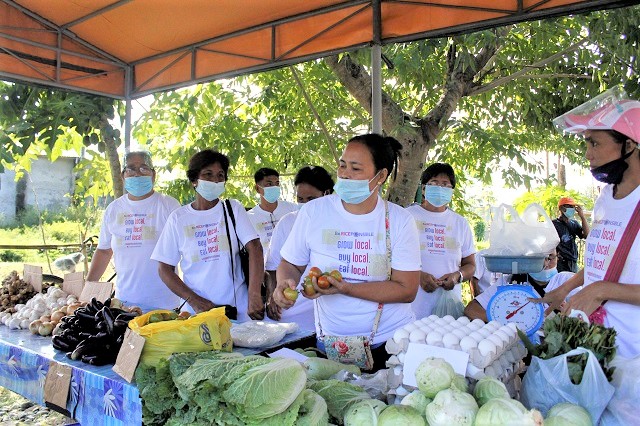
Members of the Marasat Grande and Dagupan RiceBIS Association (MarDag) in San Mateo, Isabela were willing to be together, let alone committed to doing things as a group.
The rice business lane
PhilRice Isabela started to promote RiceBIS in 2017 in San Mateo, inviting 33 barangay captains to serve as farmer-cooperators. In the end, only Jose V. Guillermo from Brgy. Marasat Grande and Diosdado S. Sagaysay from Brgy. Dagupan qualified after meeting the basic requirements.
According to Dr. Ofelia Malonzo, RiceBIS lead implementer in Isabela, volunteerism is the key─ the farmers who believe that the program can better their lives will join.
“It took guts. We knew that inviting people to join and commit would be challenging. And since we saw that RiceBIS could be a big help to our community, we volunteered,” Guillermo said.
Change in mindset
Before RiceBIS came into their lives, MarDag farmers were mere individual producers and sellers, didn’t practice product consolidation, and had no entrepreneurial mentality. Aside from lack of agri-business skills, dealing with people having different perceptions and attitudes on money, and presence of discerning leaders were their important considerations in group marketing.
Guillermo used to harvest 40 sacks of inbred rice or 60 sacks hybrid at 55-57kg/sack from his irrigated 4,000m2 field. He kept a portion of his harvest for household rice security and then sold off the rest. Guillermo recalls parting with his produce at only P11-14/kilo straight to traders who are especially active come harvesting time. Before joining RiceBIS, he only earned P13,000 every season.
The same can be said of Milagros S. Reyes of Dagupan and currently MarDag’s chairperson who immediately sold her produce to traders and took home a measly P45,000-P60,000 every cropping season from her 1.5-ha farm.
“Most of our farmers don’t keep records. They were not adept at banking and handling legal matters and activities to manage an agriculture-based organization. With RiceBIS, farmers are guided not just in increasing their yield but their income, as well,” Malonzo outlined the program.
“At first, it was difficult to practice what we were taught regarding entrepreneurship but, as time went by, we gained knowledge and confidence. We realized that in farming, we should also pay attention to processing and marketing our harvests so that our net income would not stagnate,” Guillermo summarized the group’s experience.
The MarDag RiceBIS Association was eventually formed and registered with the Department of Labor and Employment in October 2018, with 103 initial members.
Growing business
Thanks to RiceBIS, Guillermo and Reyes learned more efficient ways of rice farming. They adopted the PalayCheck System and other modern farm knowledge and practices. Their expenses were reduced and their yields steadily inched up. They now consolidate and process their produce, actively scan the market for better deals, and promote their group’s business.
From P13,000, Guillermo now earns an average of P25,000 every planting season. Reyes, on the other hand, makes P75,000-P80,000 during the dry season and P65,000-P70,000 during the wet season. They usually plant NSIC Rc222, Rc402, SL-8H, and Bigante. Even when palay prices hit low in reaction to the Rice Tariffication Law, they still felt grateful as there were fertilizer and seed subsidies─ another benefit they enjoy for being part of a farmers’ group.
Now, MarDag has developed enterprises in milled rice trade, brown rice milling, and custom farm services. It generated about P750,000 from capital mobilization strategies, which they used to start their agroenterprises.
Amidst the pandemic, MarDag benefited from its enterprises – supplying the local government unit (LGU) with milled rice for its relief operations and providing farm machinery rental services [P500/day] to members and non-members.
RiceBIS Isabela is a partnership between PhilRice and MarDag, supported by the provincial LGU of Isabela, and the DA’s Regional Field Office (RFO) 2, Agricultural Training Institute, and the Philippine Center for Postharvest Development and Mechanization (PHilMech).
Through this partnership, MarDag has received 2 units of hand tractors and a mini combine harvester from the DA-RFO. They also requested a 4-wheel tractor, 2 transplanters, and a big combine harvester from PHilMech.
With this support and the benefits from being in a group, MarDag is not just willing to be together but commits to stay together. By any reckoning, MarDag and the other RiceBIS-anchored organizations elsewhere are representing a category of farmers who now want to draw strength from one another.




